第三单元SectionA课堂笔记
八下英语第三单元笔记整理

八下英语第三单元笔记整理Notes for Unit 3, Grade 8 English.Topic: What were you doing when the UFO arrived? Section A.Vocabulary:1. UFO Unidentified Flying Object (不明飞行物)。
2. barbecue a meal cooked on a grill (烧烤)。
3. strange unusual or not normal (奇怪的)。
4. follow to go after or come after (跟随)。
5. amazed very surprised (惊讶的)。
6. scare to frighten or make afraid (使害怕)。
7. jump to move quickly upward (跳跃)。
8. shout to speak loudly, especially in surprise, anger, or fear (喊叫)。
9. run away to leave a place quickly, especially because of fear (逃跑)。
10. while during the time that (当……时候)。
Grammar:Past Continuous Tense (过去进行时)。
+ Form: was/were + -ing.+ Usage: to describe an action that was happening at a specific time in the past.Example:While I was studying, my dog suddenly barked.Section B.Vocabulary:1. newspaper a printed paper with news, articles, advertisements, etc. (报纸)。
英语人教版七年级下册三单元a部分笔记

英语人教版七年级下册三单元a部分笔记全文共四篇示例,供读者参考第一篇示例:第三单元主题:Travel PlansUnit 3 A部分笔记一、词汇1. travel:旅行,旅游2. continue:继续3. ride:乘坐4. subway:地铁5. ticket:车票6. station:车站7. return:返回8. get off:下车9. on one's own:独自10. excited:激动的二、句型1. Where do you want to go on your next vacation?你下次想去哪里度假?2. I want to visit my grandparents in Beijing.我想去北京看望我的祖父母。
3. How are you going to get there?你打算怎么去那里?4. I'm going to take a plane because it's fast.我要坐飞机,因为它很快。
5. Are you going to bring anything with you?你打算带点什么?6. Yes, I'm going to bring some snacks and a book.是的,我准备带一些零食和一本书。
7. When are you leaving?你几时出发?8. I'm leaving on Saturday morning.我星期六早上出发。
9. How long are you going to stay?你打算待多久?10. I'm going to stay for a week.我打算待一个星期。
四、写作假如你计划去北京旅行,可以按照以下内容写一篇短文:以上是关于人教版七年级下册第三单元A部分的笔记,希望能帮助大家更好地理解和掌握相关知识。
祝大家学习愉快!第二篇示例:Unit 3 My weekendPart AIn this unit, we will talk about our activities and schedules during the weekends. Here are the key points to remember:第三篇示例:Unit 3A 部分1. Words and expressions1) full of 充满着2) kind of 有点3) active 活跃的4) child 孩子5) museum 博物馆6) babysit 照看孩子7) playground 游乐场8) simple 简单的9) lesson 课程10) picnic 带野餐11) scientist 科学家12) CBC Children’s Hospital 加拿大传教那润儿童医院13) game 游戏14) story 故事15) song 歌曲16) home 家19) winter 冬天20) spring 春天21) new year 新年22) beach 海滩23) shore 海岸24) Easter 复活节25) Christmas 圣诞节26) the Fort George Park 乔治堡公园27) ice cream 冰淇淋28) egg 蛋29) sound 听起来30) relax 放松2. Sentences1) What do you do on weekends?你周末做什么?2) I usually watch TV and play with my friends.我通常看电视和和朋友玩。
英语人教版七年级下册三单元a部分笔记
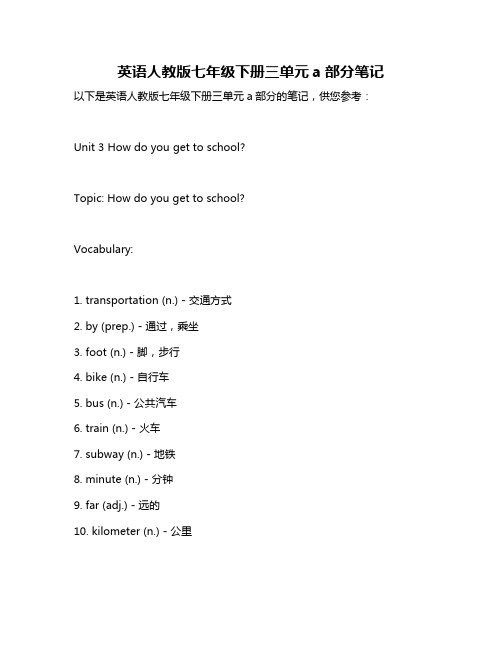
英语人教版七年级下册三单元a部分笔记以下是英语人教版七年级下册三单元a部分的笔记,供您参考:Unit 3 How do you get to school?Topic: How do you get to school?Vocabulary:1. transportation (n.) - 交通方式2. by (prep.) - 通过,乘坐3. foot (n.) - 脚,步行4. bike (n.) - 自行车5. bus (n.) - 公共汽车6. train (n.) - 火车7. subway (n.) - 地铁8. minute (n.) - 分钟9. far (adj.) - 远的10. kilometer (n.) - 公里Grammar:1. Present Simple Tense - 一般现在时态2. Prepositions of Method - 表示方式的介词(如by)3. Adverbs of Time - 时间状语(如every day, sometimes)4. Adverbs of Frequency - 频率状语(如usually, never)5. Adverbs of Degree - 程度状语(如very, a little)6. Adverbs of Place - 地点状语(如here, there)7. Adverbs of Manner - 方式状语(如slowly, quickly)8. Adverbs of Purpose - 目的状语(如to go to school, to buy a book)9. Adverbs of Condition - 条件状语(如if, unless)10. Adverbs of Time and Place - 时间地点状语(如when, where)Example Sentences:1. I get to school by bus every day. (我每天乘公交车去学校。
人教部编版八年级下册英语Unit 3 Section A grammar 笔记汇总
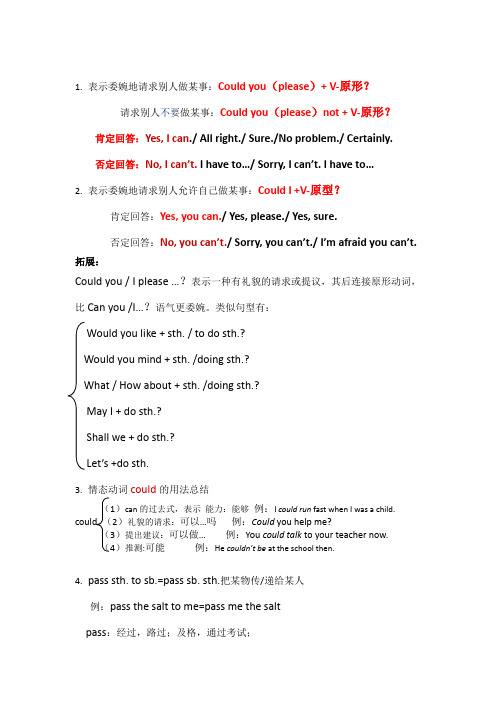
1.表示委婉地请求别人做某事:Could you(please)+ V-原形?请求别人不要做某事:Could you(please)not + V-原形?肯定回答:Yes, I can./ All right./ Sure./No problem./ Certainly.否定回答:No, I can’t. I have to…/ Sorry, I can’t. I have to…2.表示委婉地请求别人允许自己做某事:Could I +V-原型?肯定回答:Yes, you can./ Yes, please./ Yes, sure.否定回答:No, you can’t./ Sorry, you can’t./ I’m afraid you can’t. 拓展:Could you / I please …?表示一种有礼貌的请求或提议,其后连接原形动词,比Can you /I…?语气更委婉。
类似句型有:Would you like + sth. / to do sth.?Would you mind + sth. /doing sth.?What / How about + sth. /doing sth.?May I + do sth.?Shall we + do sth.?Let’s +do sth.3.情态动词could的用法总结(1)can的过去式,表示能力:能够例:I could run fast when I was a child. could (2)礼貌的请求:可以…吗例:Could you help me?(3)提出建议:可以做…例:You could talk to your teacher now.(4)推测:可能例:He couldn’t be at the school then.4.pass sth. to sb.=pass sb. sth.把某物传/递给某人例:pass the salt to me=pass me the saltpass:经过,路过;及格,通过考试;pass the exam考试及格pass by路过,经过5.①borrow借用,借来borrow sth. / borrow sth. from sb.从...借来某物例:我能借那本书吗?Could I borrow that book?Could I borrow that book from you?②lend借出,借走lend sb. sth. = lend sth. to sb. 把某物借给某人例:你能把那本书借给我吗?Could you please lend me that book?Could you please lend that book to me?③keep(保留)。
八下英语人教版第三单元笔记

八下英语人教版第三单元笔记Notes for Unit 3, Grade 8, English (PEP Edition)。
Section A.1. Vocabulary.go on vacation: to take a vacation, travel for pleasure.stay at home: to remain in one's home, not go out.go to the mountains: to visit mountainous areas.go to the beach: to visit a beach.visit museums: to go to museums, look at exhibits.go shopping: to shop, buy things.go swimming: to swim, usually in a pool or the sea.go boating: to row a boat, usually on a lake or river. go skating: to skate, usually on ice.go walking: to walk, usually for pleasure or exercise.rent videos: to borrow movies or TV shows to watch at home.sleep a lot: to sleep a lot, usually due to beingtired or lazy.eat out: to eat meals outside the home, such as in a restaurant.something different: something unusual or unique.take photos: to capture images with a camera.buy gifts: to purchase presents for others.go hiking: to walk in the countryside or mountains for pleasure.quite a few: many, a considerable number.taste good: to have a pleasant flavor.have a good time: to enjoy oneself, have fun.feel like: to have a desire or inclination to do something.go to the summer camp: to attend a camp during the summer, usually for fun or to learn new skills.2. Grammar.Present Simple Tense: This unit reviews the present simple tense, which is used to describe habitual or routine actions, or actions that are true at the present moment. Verbs in this tense are conjugated with "-s" or "-es" forthird-person singular subjects (he/she/it). Example: "She always goes to the beach in the summer."Modal Verbs: The unit also introduces modal verbs such as "can," "could," "may," "might," "must," and "should." These verbs express possibility, necessity, obligation, or advice. Example: "You could try renting some videos for the weekend."3. Expressions and Sentences."What did you do last weekend?" Inquiry about someone's activities during the past weekend."I went to the mountains." Response stating where someone went during the weekend."Did you go with anyone?" Inquiry asking if the person went with someone else."No, I didn't. My family went there." Negative response with further explanation."What did you do?" General inquiry about someone's activities."I rented some videos and slept a lot." Response describing what the person did."Did you buy any special gifts?" Inquiry asking if the person purchased any unique gifts."Yes, I bought my mom a book." Positive response with details."How was your vacation?" Inquiry asking about someone's vacation experience."It was great!" Positive response expressing satisfaction.Section B.1. Vocabulary.camp: a temporary shelter or place where people stay for a short period of time, especially for outdoor activities.lake: a large body of fresh water surrounded by land.beach: a shore or margin of the sea or a large lake, usually with sand or gravel.bad weather: unpleasant or uncomfortable weather conditions.quite a bit: a considerable amount.quite a little: a considerable amount (used with uncountable nouns)。
人教英语八上第3单元sectionA知识点总结

比较级的常用句型结构
1、两者之间的比较,句中有明显的标志词 than
1. A+ be+形容词比较级+ than +B A+实义动词+副词比较级+ than +B
修饰动词work
• 【即学活用】 • The _________boy always does ________and _________. • A. hard-working, works hard, hard work • B. works hard, hard-working, hard work • C. hard-working, hard work, works hard • D. works hard, hard-working, hard work
It’s getting darker and darker.
more and more+原级 “越来越···” (多音节词和部分双音节词) Tai Yuan is becoming more and more beautiful.
7. 比较级形式用来表示最高级概念(1比多) 比较级+ than any other+单数名词 比较级+ than the other +复数名词 (···比其他任何一个都···)
Hard-working 形容词,努力工作的,勤勉的
a hard-working boy
Hard work Work hard
名词短语,辛苦的工作,hard是形 this is hard work,
人教版英语9年级上册第3单元sectionA知识点总结

Ⅱ. 根据所给的汉语提示,用合适的单词填空。
1. My parents suggest/advise (建议) that I join the Drawing Club. 2. The wine is made from the best grapes (葡萄). 3. On the postcard (明信片), there is a photo of the Eiffel Tower. It must be from France. 4. With the help of WIFI, people can send mails (邮件) on their smart phones. 5. Andy is in the bathroom(浴室) now. Would you please call later?
Ⅰ. 根据所给的首字母提示,用合适的单词填空。 1. Can you buy me a s stamp when you walk past the post office? 2. Both Shanghai and Nanjing are big cities in the e__e_a_st__of China. 3. The cinema is b beside the park, just on its right. 4. I’m sorry, but I must go now—I’m in a r rush . 5. CCTV is short for China C Central Television.
1. 沿着……走 2. 在某人的右边/左 3. 向右/左拐 4. 做某事很兴奋 5. 需要做某事 6. 快点;加油 7. 直到……才…… 8. 建议做某事 9. 在某人去……的 10. 路过
Unit3SectionA知识点英语七年级下册

Unit 3 Will people have robots?知识要点一:There will be fewer people. 将会有更少的人。
(1) there will be 意为“将有;会有”,是There be 的一般将来时,其否定形式是“There won't be...”,一般疑问句形式是“Will there be...?”There will be...有时可以与There is /are going to be..相互转换。
例如;(2) 【辨析】fewer/less[【only ,just 等时,常用a little 或修饰名词。
? buy知识100它们帮忙做家务并在脏的或危险的地方工作。
(1)help (sb.) with sth.=help (sb.) (to) do sth.意为“帮助(某人)做某事”。
例如:He often helps his mother with the housework .=He often helps his mother (to) do the housework .危险的 safe adj.安全的dangrer n.危险 其反义词为 safety n.安全dangerously adv.危险地 safely adv.安全地知识要点四:Today there are already robots working in factories. 现在已经有机器人在工厂里干活了。
(1) There be sb./sth.doing sth.意为“有某人/物正在做某事”,sb.或sth.与doing sth.构成逻辑上的主谓关系,并且表示动作正在进行。
例如:There is somneone talking in class.有人在课上说话。
There are birds flying in the sky.天空中有鸟在飞翔。
(2) already 意为“已经;早已”,用于肯定句,置于句中或者句末均可。
人教版九年级英语第三单元 Unit 3 Section A 知识点精讲
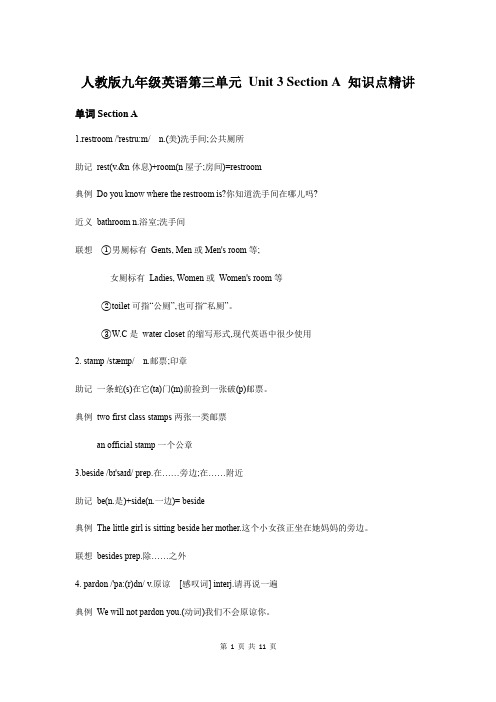
人教版九年级英语第三单元Unit 3 Section A 知识点精讲单词Section A1.restroom /'restru:m/ n.(美)洗手间;公共厕所助记rest(v.&n休息)+room(n屋子;房间)=restroom典例Do you know where the restroom is?你知道洗手间在哪儿吗?近义bathroom n.浴室;洗手间联想①男厕标有Gents, Men或Men's room等;女厕标有Ladies, Women或Women's room等②toilet可指“公厕”,也可指“私厕”。
③W.C是water closet的缩写形式,现代英语中很少使用2. stamp /stæmp/ n.邮票;印章助记一条蛇(s)在它(ta)门(m)前捡到一张破(p)邮票。
典例two first class stamps两张一类邮票an official stamp一个公章3.beside /bɪ'saɪd/ prep.在……旁边;在……附近助记be(n.是)+side(n.一边)= beside典例The little girl is sitting beside her mother.这个小女孩正坐在她妈妈的旁边。
联想besides prep.除……之外4. pardon /'pa:(r)dn/ v.原谅[感叹词] interj.请再说一遍典例We will not pardon you.(动词)我们不会原谅你。
Pardon? I didn't catch what you said.(感叹词)请再说一遍,我没听懂你说的话短语pardon me抱歉,对不起;请再说一遍5. rush /rʌʃ / v.&n.仓促;急促典例The children rushed out of the school.(动词)孩子们冲出学校。
Go for it七年级上册Unit3 SectionA 笔记
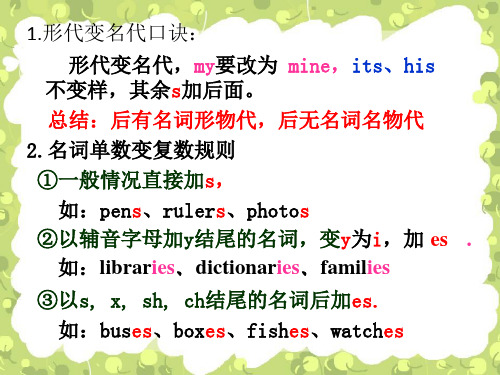
15.—Is that ____schoolbag?
—No, _____is white.
A. his ; his B. her; his C. her; her
6. —Is ห้องสมุดไป่ตู้hat ____English dictionary?
—No, it’s ____ Chinese one.
A. a; a
B. an ; an C. an; a
7. —____do you spell ruler?
—R-U-L-E-R, ruler.
A. Can
B. How
C. How’s
1.形代变名代口诀: 形代变名代,my要改为 mine,its、his
不变样,其余s加后面。 总结:后有名词形物代,后无名词名物代 2.名词单数变复数规则 ①一般情况直接加s,
如:pens、rulers、photos ②以辅音字母加y结尾的名词,变y为i,加 es .
如:libraries、dictionaries、families ③以s, x, sh, ch结尾的名词后加es.
Exercise
一、单项选择。 1.Thank you very much _____ your help. A. at B. for C. with 2. —Is this pencil box_____? —Yes, it is. And the notebook is ____,too. A. Gina’s; her B. Gina; hers D. Gina’s; hers 3. Look at the man over there. He is ___ uncle. A. Jim’s and Tim’s B. Jim’s and Tim C. Jim and Tim’s
人教版七年级下unit3sectionA笔记

重点短语1. get to school 到达学校get to sp 到达某地(表示目的地的词是副词here ,there , home 时不用介词to ) get home /here /there2. take the train 乘火车take a /the +交通工具(放在句中)take a /the bus/ train/car/boat /planeby +交通工具(放在句末)by bus /train /car/boat /planein a/the car/taxi;多用于封闭式交通工具on a/the bus/train/bike/boat多用于开放式或半封闭式交通工具3. take the subway 乘地铁4. ride a bike 骑自行车ride one’s bike eg:I ride my bike.walk =go ...on footeg: I walk to school . = I go to school on foot .5. how do you get to school 怎么到达学校How +do/does+sb.+get to+地点.有两种回答方式1.take a /the +交通工具2.)by +交通工具或者on /in +限定词+交通工具Eg:How do you get to school?I take the bus to school./I get to school by bus./ I get to school on the bus.6.one hundred and five 105基数词+hundred thousand“千”,million“百万”,billion“十亿”hundreds of+名词复数7.how far 多远对两地之间的距离、路程提问How far is it from A to B?或How far is B from A?意为“从A到B有多远?”,其答语是“It’s…meter(s)/mile(s)/kilometer(s)(away).”,意为“有……米/英里/千米(远)。
新目标英语八年级英语上册第三单元SectionA知识点归纳

八年级英语上册第三单元Section A知识点归纳:1.形容词、副词的比较级的相关知识:(1)。
规则变化:以e结尾的家r,例如:late---later, 以重读闭音节且一个辅音字母结尾的双写这个辅音字母再加er ,例如:big—bigger, thin----thinner, fat---fatter,(闭音节是指音节中的元音字母发单元音短音) ,以辅音字母家y结尾的双音节词,(每个音节之间有很短暂的停顿),把y变i再加er,以ed和ing结尾的形容词在词前加more,例如:tired---more tired , exciting----more exciting, 以ly结尾的副词在词前加more,例如:loudly----more loudly, quietly----more quietly (注意:friendly和lovely 为形容词) 多音节词在词前加more ,例如:popular---more popular(2).常见不规则变化:good/ well----better , bad/ badly----worse , little----less, far---farther(主要指距离远),或further(主要指程度深) old—elder (年长的例:my elder brother 我的哥哥)(3).形容词和副词的前后比较对象要一致(即后面的比较对象要和前面的主语保持一致)例如:Tom has longer hair than his brother .(本句中Tom为主语,所以than 后应该加的是his brother ,而不是his brother’s hair) Tom’s hair is longer than his brother’s .(本句中主语是Tom’s hair, 所以比较的对象应该是his brother’s hair )(4)双方比较表示一方不如另一方时用not as/ so ……as 或者less than 例如:This room is more beautiful than that one .=That room is not as/ so beautiful as this one .= That room is less beautiful than this one.(5) 表示一方随另一方的程度而变化用the +比较级,the+比较级,越……..,越……….例如:The more, the better 越多越好(多多益善)The harder he works, the happier he feels. 及时练习:The more he eats, the _________( fat) he gets. (6)不与其他事物比较,表示本身程度的变化时,用比较级+and+比较级结构。
2015版新目标英语九年级第三单元Section A知识点归纳
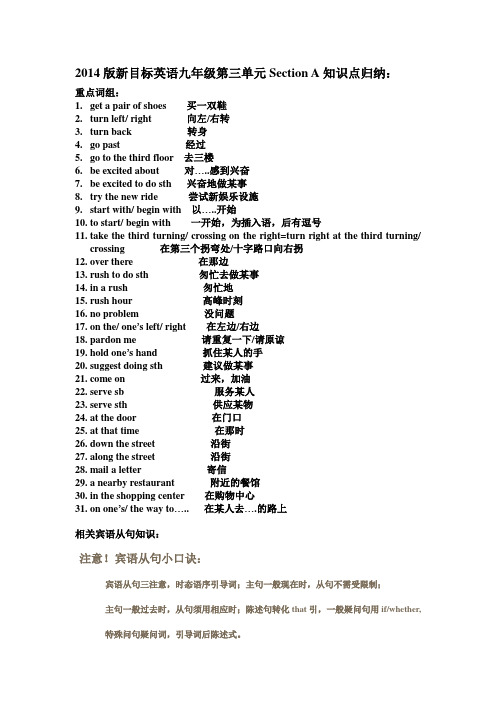
2014版新目标英语九年级第三单元Section A知识点归纳:重点词组:1.get a pair of shoes 买一双鞋2.turn left/ right 向左/右转3.turn back 转身4.go past 经过5.go to the third floor 去三楼6.be excited about 对…..感到兴奋7.be excited to do sth 兴奋地做某事8.try the new ride 尝试新娱乐设施9.start with/ begin with 以…..开始10.to start/ begin with 一开始,为插入语,后有逗号11.take the third turning/ crossing on the right=turn right at the third turning/crossing 在第三个拐弯处/十字路口向右拐12.over there 在那边13.rush to do sth 匆忙去做某事14.in a rush 匆忙地15.rush hour 高峰时刻16.no problem 没问题17.on the/ one’s left/ right 在左边/右边18.pardon me 请重复一下/请原谅19.hold one’s hand 抓住某人的手20.suggest doing sth 建议做某事e on 过来,加油22.serve sb 服务某人23.serve sth 供应某物24.at the door 在门口25.at that time 在那时26.down the street 沿街27.along the street 沿街28.mail a letter 寄信29.a nearby restaurant 附近的餐馆30.in the shopping center 在购物中心31.on one’s/ the way to….. 在某人去….的路上相关宾语从句知识:注意!宾语从句小口诀:宾语从句三注意,时态语序引导词;主句一般现在时,从句不需受限制;主句一般过去时,从句须用相应时;陈述句转化that引,一般疑问句用if/whether, 特殊问句疑问词,引导词后陈述式。
九年级英语课堂笔记unit-3-Could-you-please-tell-me-where-the-restrooms-are-?
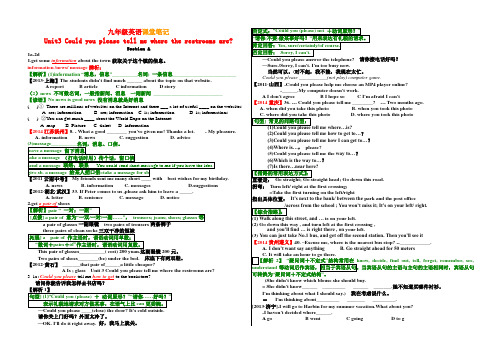
九年级英语课堂笔记Unit3 Could you please tell me where the restrooms are?Section A1a-2d1.get some information about the town 获取关于这个镇的信息。
information /news/ message 辨析:【解析】(1)information “消息,信息”__________名词) 一条信息_________________________ 【2013·上海】The students didn't find much ______ about the topic on that website. A report B article C information D story(2)news 不可数名词,一般指新闻、消息 一则新闻 ___________________________ 【谚语】No news is good news 没有消息就是好消息( )① There are millions of websites on the Internet and there ___ a lot of useful ____ on the websites.A. are; informationB. are; informationC. is; informationD. is; informations ( ) ②You can get much ____ about the World Expo on the Internet. A. map B. Picture C. ticket D. information【2014江苏扬州】8. - What a good ________ you've given me! Thanks a lot. - My pleasure. A. information B. news C. suggestion D. adviceA. newsB. informationC. messagesD.suggestions 【2012·湖北·武汉】33. If Peter comes to us ,please ask him to leave a _____.A. letterB. sentenceC. messageD. notice200元。
八年级上册英语第三单元a部分知识点
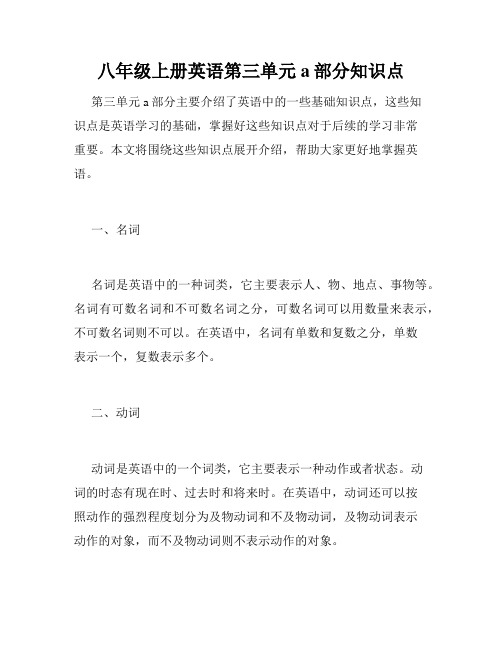
八年级上册英语第三单元a部分知识点第三单元a部分主要介绍了英语中的一些基础知识点,这些知识点是英语学习的基础,掌握好这些知识点对于后续的学习非常重要。
本文将围绕这些知识点展开介绍,帮助大家更好地掌握英语。
一、名词名词是英语中的一种词类,它主要表示人、物、地点、事物等。
名词有可数名词和不可数名词之分,可数名词可以用数量来表示,不可数名词则不可以。
在英语中,名词有单数和复数之分,单数表示一个,复数表示多个。
二、动词动词是英语中的一个词类,它主要表示一种动作或者状态。
动词的时态有现在时、过去时和将来时。
在英语中,动词还可以按照动作的强烈程度划分为及物动词和不及物动词,及物动词表示动作的对象,而不及物动词则不表示动作的对象。
三、形容词形容词是英语中的一个词类,它主要用来描述名词的性质或者状态。
形容词有比较级和最高级之分,比较级用来比较两者之间的大小、多少等差异,最高级则用来比较三者或者以上之间的大小、多少等差异。
四、副词副词是英语中的一个词类,它主要用来修饰动词、形容词或者其他副词,表示时间、地点、程度等。
副词有比较级和最高级之分,用来表示事物在这些方面的强弱差异。
五、介词介词是英语中的一个词类,它主要用来表示两个名词之间的关系,例如地点、时间、方式等。
介词还可以用来表示方位、目的、原因等。
六、冠词冠词是英语中的一个词类,它用来限定名词的范围,分为定冠词和不定冠词两种。
定冠词用来指定特定的人或者物,不定冠词则表示泛指的意思。
七、代词代词是英语中的一个词类,它用来代替名词,可以有效避免重复使用名词的情况发生。
代词分为人称代词、物主代词、指示代词、不定代词和关系代词等。
总结本文介绍了英语中的一些基础词类及其特点,这些词类的掌握对于英语学习非常重要。
在学习英语的过程中,需要多加练习,并注重应用。
只有通过不断地实践,才能真正掌握好这些知识点,从而取得良好的成绩。
八年级下册英语第三单元3a笔记

八年级下册英语第三单元3a笔记Title: Exploring Unit 3A of Eighth Grade English Textbook Unit 3A of the eighth-grade English textbook delves into various aspects of daily routines, habits, and time management. Here, students are introduced to vocabulary and grammar structures that are essential for expressing daily activities, discussing schedules, and describing routines. Let's explore the key points covered in this unit.1. **Vocabulary**:- The unit begins with a range of vocabulary related to daily routines, such as "wake up," "get dressed," "have breakfast," "go to school," and "do homework." These words are fundamental for describing typical activities that occur throughout the day.2. **Present Simple Tense**:- The unit extensively covers the present simple tense, which is crucial for describing habitual actions. Students learn how to conjugate verbs in the present simple tense for different subjects (I, you, he/she/it, we, they) and how to form affirmative, negative, and interrogative sentences.3. **Adverbs of Frequency**:- Students learn about adverbs of frequency such as "always," "usually," "often," "sometimes," and "never." These adverbs are used to indicate how often certain actions occur in daily routines. They are usually placed before the main verb in a sentence.4. **Expressing Time**:- This unit also teaches students how to express time using prepositions such as "at," "in," and "on." They learn to use these prepositions correctly when discussing daily schedules and routines. For example, "I have breakfast at 7o'clock" or "We have English class on Monday."5. **Sequencing Words**:- Students are introduced to sequencing words like "first," "then," "next," "after that," and "finally." These words help students organize their ideas when describing the order of activities in a daily routine.6. **Listening and Speaking Activities**:- Throughout the unit, students engage in various listening and speaking activities to practice the vocabulary and grammar structures learned. These activities often involve describing their own daily routines, asking and answering questions about schedules, and discussing time management strategies.7. **Reading Comprehension**:- The unit includes reading passages related to daily routines, allowing students to practice reading comprehension skills while also reinforcing the vocabulary and grammarconcepts covered in the unit. These passages may feature interviews with people discussing their daily habits orarticles about the importance of time management.8. **Writing Tasks**:- Students are assigned writing tasks that require themto describe their own daily routines, create schedules for imaginary characters, or write journal entries about atypical day in their lives. These writing tasks helpreinforce vocabulary and grammar skills while alsoencouraging creativity and self-expression.In conclusion, Unit 3A of the eighth-grade Englishtextbook provides students with a comprehensive understanding of vocabulary, grammar, and language skills necessary for discussing daily routines and managing time effectively. Through a variety of activities including vocabulary practice, grammar drills, listening exercises, speaking tasks, reading passages, and writing assignments, students developproficiency in expressing themselves confidently and accurately in English.。
八年级上册第三单元a部分知识点

八年级上册第三单元a部分知识点本文将为大家介绍八年级上册第三单元a部分的知识点,主要内容包括数学和语文两个学科。
一、数学1. 分式的定义分式是两个整式的比,形如a/b,其中a和b是整式,b不为零。
2. 分式的化简(1)约分:将分子与分母同时除以一个相同的因数。
(2)通分:将分式的分母化为相同的多项式。
(3)合并同类项:将分子或分母中的同类项合并。
3. 分式的乘法和除法(1)分式的乘法:分子与分子相乘,分母与分母相乘。
(2)分式的除法:分子与分母交换,变成分子乘以倒数。
4. 一元一次方程一元一次方程是一个未知数的一次方程,形如ax+b=c,其中a、b、c为已知数,a≠0。
(1)求解一元一次方程的基本思路:将方程的各项移项,使方程变为x=常数。
(2)如何判断一个方程是否有解:将未知量的系数移到等号右边,当系数相等时,方程有解;当系数不相等时,方程无解。
二、语文1. 修辞手法修辞手法是指作者在表达意思时,通过运用一定的语言技巧将语言的表达更加生动、形象、具有感染力,从而达到强化语言效果的目的。
(1)比喻:用一个事物来比拟另一个事物,以便使另一个事物的特点更加鲜明。
(2)排比:在句子中重复使用相同的句式结构,使语言更加明确、生动。
(3)拟人:将无生命的事物拟人化,以便赋予事物感情,使描述更具感染力。
2. 古文阅读古文阅读是语文学科中的一项重要内容,其重点在于读懂古人留下的著作,理解其深层含义,进而将古人的思想精髓和文化传承下去。
(1)理解上下文:在阅读古文时,要通过上下文把握整个文章的大意,理解其中的每一个字、词、句的含义。
(2)采用翻译方法:在翻译古文时,要注重翻译句式、修辞手法等,还要注意句子中每个字的含义,避免出现翻译错误。
通过以上的学习,相信大家已经对八年级上册第三单元a部分的数学和语文知识点有了一定的了解,希望大家能够在学习中不断提高自己,取得更好的成绩。
第三单元SectionA课堂笔记

2
3
Notes to the Text—Focus Study
compromise: n. an agreement that is achieved after everyone involved accepts less than what they wanted at first 妥协 Example: After several hours of discussion, they managed to reach a compromise.
1
1
Text Study Notes to the Text Words and Expressions Idea Sharing
Writing
Understanding Structure Analysis Detailed study of the text
Summary
2
3
Text Study—Understanding
2
3
Text Study—Structure Analysis
- 1、下载文档前请自行甄别文档内容的完整性,平台不提供额外的编辑、内容补充、找答案等附加服务。
- 2、"仅部分预览"的文档,不可在线预览部分如存在完整性等问题,可反馈申请退款(可完整预览的文档不适用该条件!)。
- 3、如文档侵犯您的权益,请联系客服反馈,我们会尽快为您处理(人工客服工作时间:9:00-18:30)。
Questions: 1. How many parts can the text divided into ? 2. What is the main idea of each part ?
2
3
Text Study—Structure Analysis
Part 1: Paras.1-4
尽管存在种族和文化的差异,Gail和mark 在尊重 和互信的基础上仍然走到了一起 In spite of their racial and cultural differences, Gail and mark were held together by the strength of mutual trust and respect.
1
1
Text Study Notes to the Text Words and Expressions Idea Sharing
Writing
Understanding Structure Analysis Detailed study of tΒιβλιοθήκη e textSummary
2
3
Text Study—Understanding
I. Understanding
Read the text quickly and understand the text
by filling in the blanks with the information given in the text.
2
3
Text Study—Understanding
2
3
Notes to the Text—Focus Study
compromise: v. reach an agreement by making a compromise
Examples: 1)We finally comprised on a price.
2)The government has compromised with other party leaders over the date of the next general election. 政府与其他党派领导人就下届大选日期达成了妥协。
e.g.2 When we learn that the distinguished professor
assuring us of the safety of a particular product holds a consultancy with the company making it, we cannot be blamed for wondering whether his fee might conceivably cloud his professional judgment.
2
3
Text Study—Understanding
What was her father’s response?
When Gail‟s father heard the news, he approached our decision with _______ a fatherknows-best __________ attitude. He doubted that I was marrying in order to ______ in remain the USA , for I had problems with the Citizenship Department. So, they all ___________ that Gail be sure that suggested she was doing the wrong thing ___________________________and she may _______________. change her mind
2
3
examples
• e.g.1 He believes that this very difficulty may have
had the compensating advantage of forcing him to think long and intently about every sentence, and thus enabling him to detect errors in reasoning and in his own observations。
2
3
Text Study—Structure Analysis
Part 2: Paras.5-9
尽管存在种族和文化的差异,Gail和mark 在尊重 和互信的基础上坚持走到了一起 Although Gail‟s mother thought mark was charming and intelligent and his color was not the problem, she still considered that they need more time to make the decision.
2
3
exercises
• 他是一个令其朋友都钦佩,甚至连敌人多尊敬的 人 • He was a man whom all of his friends admired and who won the respect even of his enemies.
2
3
Para.4
• We wanted to avoid the mistake made by many couples of marrying for the wrong reasons, and only finding out ten, twenty or thirty years later that they were incompatible, that they hardly took the time to know each other, that they overlooked serious personality conflicts in the expectation that marriage was an automatic way to make everything work our right. • 主,谓,宾,定,同位语
2
3
Text Study—Understanding
What did her mother think?
When Gail‟s mother heard the news, instead congratulations of ____________ she _________ Gail to counseled reconsider our marriage . Though she regarded me as ________ and _________, charming intelligent she was afraid that Gail may be marrying me for ______ reasons. wrong
Why did we decide to get married?
Gail and I had experienced ups and downs ___ _____ in two years, now we come to _____, know _________ and _________ each other. understand respect weaknesses strengths We confronted __________ and ________ of each other‟s character. We have learnt to open be tolerant ____________ and _____. The ______, compromising source of our strength was our mutual trust ____ and _______. respect
2
3
Split the sentence into four
• We wanted to avoid the mistake that many couples hardly took the time to know each other • We also wanted to avoid the mistake that many couples overlooked serious personality conflicts in the expectation that marriage was an automatic way to make everything work our right • The mistakes are made by many couples of marrying for the wrong reasons • The mistakes are made by many couples of finding out they were incompatible ten, twenty or thirty years later (after their marriage)
1. …we had experienced the usual ups and downs of a couple learning to know, understand, and respect each other. (Para. 1) 后置定语修饰ups and downs. 用介词of 引导,表从属关系 形容词:Someone important 副词:the clouds above 介词:the south side of Changjiang river 不定式:things to be done 分词: the girl sitting by my side 从句:the man I saw told me that.
